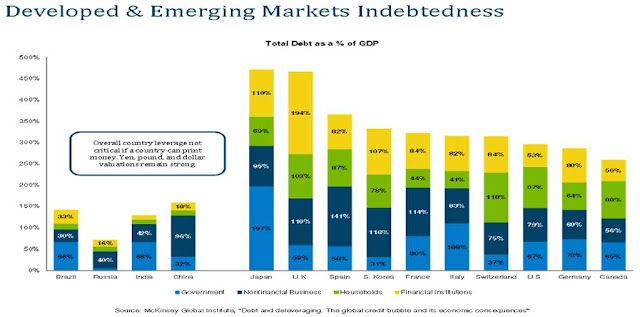Η «Ουτοπία του ΣΥ-μερα»
Το πρόβλημα, σήμερα, με την Ουτοπική
προσέγγιση της ριζοσπαστικής αριστεράς και των συνιστωσών, ότι δηλαδή υπάρχει
ένα άλλο σύστημα που δεν θα βασίζεται στο κέρδος αλλά στην αταξική κοινωνία,
είναι ότι και στο παρελθόν η προσέγγιση αυτή απέτυχε οικτρά. Είτε στην εφαρμογή
της είτε εκ του αποτελέσματος οδήγησε σε απερίγραπτο πόνο και απελπισία
εκατομμύρια ανθρώπους στον πλανήτη.
Είναι όμως ταυτόχρονα αλήθεια ότι ένα από
τα μεγαλύτερα εμπόδια για τον εκσυγχρονισμό της Ελλάδας, και βασική αιτία της
χρεοκοπίας μας, είναι οι ολιγαρχίες: Οικονομικές, συντεχνιακές και πολιτικές.
Όμως η κατάργησή τους δεν μπορεί να περνάει μέσα από την αντικατάστασή τους από
άλλες «κομματικές» τύπου υπαρκτού σοσιαλισμού, κάτι το οποίο κρίνεται απαραίτητο
για την συνέχιση της λειτουργίας του κράτους, έστω και προσωρινά (ή μόνιμα κατά
τον Στάλιν και τον Μάο). Έτσι, την δύναμη του χρήματος –βασικό χαρακτηριστικό
των ολιγαρχιών- θα την αντικαταστήσει η επιρροή του πολιτικού γραφείου και της
κομματικής ιεραρχίας η οποία θα νέμεται την εξουσία.
Στις φιλελεύθερες κοινωνίες της ελεύθερης
αγοράς, όλοι έχουν πρόσβαση στην δυνατότητα απόκτησης πλούτου (ευμάρεια) και
στις πιο ανεπτυγμένες από αυτές υπάρχουν και επαρκείς ασφαλιστικές δικλείδες
ώστε να μην δημιουργείται υπερσυγκέντρωση ή τουλάχιστον να μην περιορίζεται η
πρόσβαση στις ίσες ευκαιρίες. Παράλληλα στην Ευρώπη της Σοσιαλδημοκρατίας γίνεται
και κάποια αναδιανομή του πλούτου μέσω του κοινωνικού κράτους. Στις λιγότερο
ανεπτυγμένες χώρες, όπως η Ελλάδα, το παιχνίδι χάνεται συνήθως στις
ασφαλιστικές δικλείδες αλλά και στην ανισότητα πρόσβασης στις «ίσες ευκαιρίες».
Εδώ, υπάρχει αυτό το ιδιώνυμο «μετά-σοβιετικό» μοντέλο όπου οικονομικές και
συντεχνιακές ολιγαρχίες και οι πολιτικοί τους σύντροφοι συμπεριφέρονται στους
άλλους όπως ο Στάλιν στους αντιπάλους του. Τους εξοντώνουν με την
γραφειοκρατία, την ανομία και την αναλγησία του ψευδό-φιλελευθερισμού που αντί
να ανοίγει ευκαιρίες τις κλείνει.
Όμως στις ελεύθερες αγορές η δυνατότητα απόκτησης
πλούτου έχει και μια άλλη σημαντική διάσταση, αυτή της αξιοκρατίας και
αντικειμενικότητας. Ο καλύτερος ξεχωρίζει και ο ικανός επίσης. Ταυτόχρονα ο
καθένας μπορεί να αγωνιστεί για να βελτιώσει την θέση του. Οι παλιότεροι το έλεγαν
άμιλλα (ευγενής ή όχι αλλά πάντως άμιλλα: συναγωνισμός για τα πρωτεία).
Εάν όμως δεν είναι αξιοκρατικό-αντικειμενικό
το σύστημα αλλά υποκειμενικό, όπως η Ουτοπική προσέγγιση του «ΣΥ-μερα», τότε η
δύναμη περνάει αυτούσια στα χέρια των λίγων εκλεκτών και ιδανικά φωτισμένων
ηγετών της νέας τάξης (ή επανάστασης). Και μέσω αυτών καταλήγει στα χέρια των λιγότερο
φωτεινών "ταξικών" συντρόφων τους που την διαχειρίζονται εξίσου
υποκειμενικά όπως και την απέκτησαν. Άρα κάθε μορφή ισότητας ή αξιοκρατίας
καταλύεται. (το έχουμε δει το έργο αυτό με την επέλαση των πρασινοφρουρών)
Επίσης υπάρχει το πρόβλημα της ασυμβατότητας
της Ουτοπικής προσέγγισης με τον υπόλοιπο κόσμο, την παγκόσμια αλλά και κυρίως
την Ελληνική οικονομική συγκυρία. Έτσι επιλέγοντάς την θα οδηγούμασταν στο
περιθώριο. Ο απομονωτισμός και η εσωστρέφεια μιας τέτοιας «Ουτοπίας» είναι ένα
από τα βασικά αίτια της αποτυχίας κάθε τέτοιου εγχειρήματος στο παρελθόν. Πόσο
μάλλον σε συνθήκες χρεοκοπίας. Δεν θα άντεχε ούτε μια μέρα.
Ακόμα και στην Κίνα, το πείραμα οδηγεί
πλέον σε μια νέα πραγματικότητα. Και αυτή ακόμα δεν είναι απαλλαγμένη ούτε από
τις παθογένειες του παλιού ούτε και από τις αδυναμίες του καινούργιου.
Σε κάθε περίπτωση, δεν είναι το σύστημα
λάθος αλλά ο τρόπος που το λειτουργούμε. Για να πάμε μπροστά, χρειάζεται περισσότερη
ελευθερία και λιγότερος παρεμβατισμός. Χρειάζεται προπαντός «άμιλλα», κατά
προτίμηση «ευγενής».
_________________________________________________________________
Ο ΤΟΙΧΟΣ ΕΛΕΓΕ:
- Η Ουτοπία είναι αυτό που όταν κάνεις ένα βήμα προς το μέρος του
απομακρύνεται δύο, όταν κάνεις δύο βήματα απομακρύνεται τέσσερα, όταν κάνεις
τρία απομακρύνεται έξι ....
- και τότε σε τι χρησιμεύει η Ουτοπία;
- Σε κάνει να προχωράς ...





